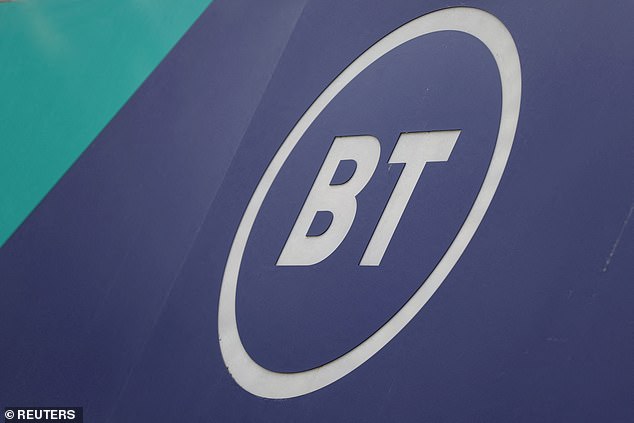- BT Group reported third-quarter adjusted turnover increased by 3% to £5.3bn
- Openreach expanded its fibre-optic network by a record 950,000 premises
- The results came on the first day of new chief executive Allison Kirkby
BT Group is on track to post profits of more than £6.1billion for 2023 as higher prices helped lift its most recent quarterly results.
The telecoms giant reported adjusted turnover increased by a better-than-expected 3 per cent year-on-year to £5.3billion in the three months ending December.
Growth was driven by price hikes in its consumer division and broadband network arm Openreach, with the latter seeing average revenue per customer jump by 10 per cent.

Upheld: Telecoms giant BT Group reiterated its annual financial targets on Thursday
Openreach further benefited from expanding its fibre-optic network by a record 950,000 premises to 13 million during the quarter.
This compensated for losing a higher-than-anticipated number of traditional phone lines – 369,000 in the year-to-date.
Consequently, BT’s adjusted earnings before nasties remained relatively flat at just over £2billion for the quarter, while pre-tax profits on a nine-month basis were 15 per cent up at £1.5billion.
The FTSE 100 company’s results come a few days after a class action case began against the business in court, alleging it overcharged customers.
Pressure group Collective Action on Land Lines (CALL), which brought the case, claims BT billed ‘excessive’ amounts to over 3 million landline customers, many of whom were pensioners or from low-income households.
Former Ofcom executive Justin Le Patourel, who runs CALL, said customers stand to collect up to £400 in compensation if it wins the lawsuit.
The trial is predicted to last eight weeks.
BT’s results have also been published on the same day that Allison Kirkby, who previously ran Swedish telco business Telia, takes the helm as chief executive.
Kirkby said: ‘BT Group has delivered another quarter of revenue and EBITDA growth, while rapidly building and upgrading customers to our full-fibre broadband and 5G networks, and we continue to be on track to achieve our financial outlook for the year.’
Scottish-born Kirkby, 56, succeeded Philip Jansen, whose tenure as CEO saw BT conduct a major restructuring effort, slashing costs and announcing up to 55,000 job cuts by 2030, with most roles set to be replaced by artificial intelligence.
While doing this, BT invested considerable sums in extending next-generation 5G mobile and full-fibre broadband across the UK.
Yet the firm was also affected by a plunging share price following strikes, rising energy and labour costs, and the expense of removing Huawei equipment from its network.
BT Group shares were 1.3 per cent higher at 113.7p on Thursday morning, although their value has still fallen by around 43 per cent over the past two years.



